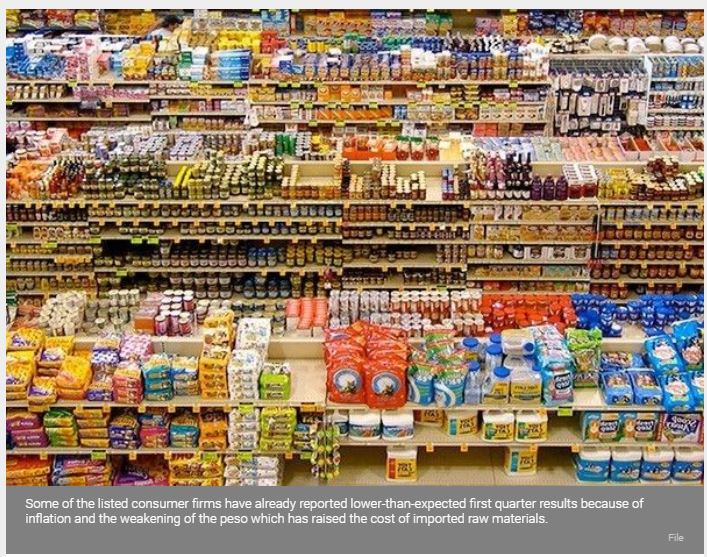Philippines: Consumer companies may raise prices
Due To Weak Peso, High Oil Prices
MANILA, Philippines — Listed consumer companies hinted of more price hikes for their food and beverage products as they are getting increasingly worried over rising inflation, high oil prices and the weakening of the peso against the dollar.
Some of the listed consumer firms have already reported lower-than-expected first quarter results because of inflation and the weakening of the peso which has raised the cost of imported raw materials.
Gokongwei-owned JG Summit Holdings Corp., for instance, saw its first quarter income drop 35.8 percent to P4.8 billion from P7.5 billion a year ago, dragged by “higher input costs and weaker peso.”
“Core net income fell on margin pressure from higher input costs and fuel prices and weaker peso at Universal Robina Corp., Petrochem and Cebu Air,” JG Summit president and chief executive officer Lance Gokongwei said in a recent presentation.
URC said its first quarter net income declined 12 percent to P3 billion from P3.4 billion a year ago because of lower coffee sales volume, higher inflation, and weaker peso.
The company may have to jack up prices soon to cope with the challenging business environment.
“If oil price is $80 (per barrel) and everybody is affected, we might have to do some adjustments in pricing,” URC president and chief executive officer Irwin Lee said on the sidelines of the company’s recent annual stockholders meeting.
Another conglomerate, Jollibee Foods Corp. (JFC) said inflation also caused gross profit margins to decline in the first quarter, albeit just slightly.
“Gross profit margins in the Philippines were only slightly below year-ago level despite rising inflation rate and cost increases brought by the tax reform and the peso depreciation,” JFC said in its first quarter report.
It expects Philippine gross profit margins to equal year ago level by the fourth quarter of 2018, even as it noted that the peso depreciation has raised costs in the Philippines.
JFC already started raising prices in 2017 to support profit margins.
The conglomerate’s net income in the first quarter grew by 17.3 percent to P1.799 billion from P1.533 billion.
LT Group Inc., the listed conglomerate of taipan Lucio Tan, also acknowledged that because of rising inflation, it would be a challenge to keep costs down.
“Higher inflation is expected for 2018, which together with the depreciation of the peso and higher fuel costs will translate to higher production costs. Freight and transportation costs are also expected to go up, so it will be a challenge for manufacturers, including LTG’s subsidiaries, to keep costs down,” LTG president Michael Tan said during the company’s annual stockholders meeting last month.
Asia Brewery, its beverage business, already sees volumes of its top-selling Cobra drinks to be affected by an increase in prices due to tax on sugary drinks under the Tax Reform For Acceleration and Inclusion (TRAIN).
The Bangko Sentral ng Pilipinas (BSP) said the inflation rate for May likely accelerated to a fresh five-year high at 4.6 to 5.4 percent due to elevated rice and domestic petroleum prices.
Inflation already leapt to a five-year high of 4.5 percent in April from 4.3 percent in March due to rising global oil prices as well as the impact of the new tax reform law.
The peso, meanwhile, closed at 52.554 against the dollar on Friday.
Analysts said inflation would continue to affect margins for consumer companies.“Oil prices are going to continue to raise inflation and affect margins for consumer companies. We may see a five percent to 10 percent increase in prices of consumer goods, but I dont think we will see a substantial drop in their sales,” said Chris Mangun, president of Eagle Equities Inc.
Source: https://www.philstar.com/business/2018/06/04/1821299/consumer-companies-may-raise-prices#RCf7G20JoOPDzTv3.99


 English
English




